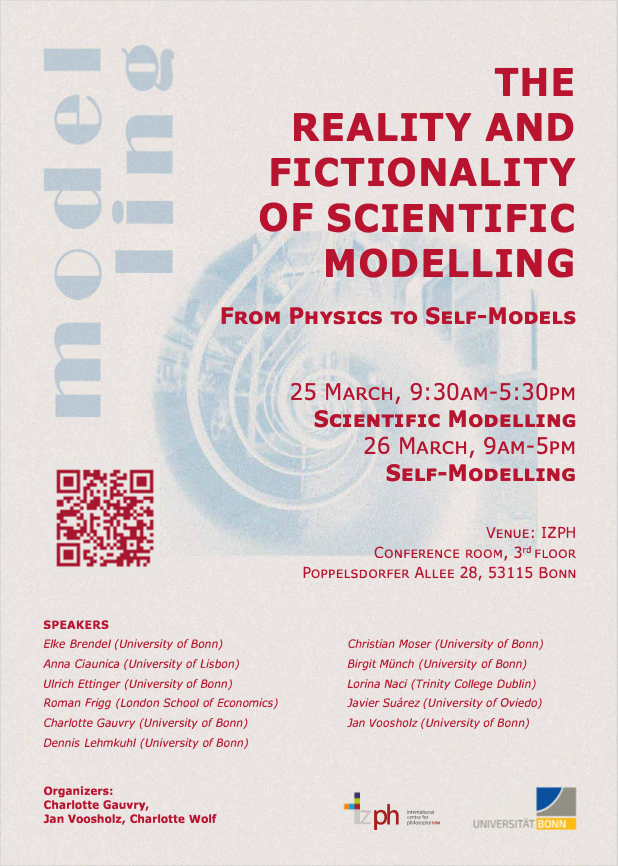The Reality and Fictionality of Scientific Modelling: From Physics to Self-Models
Modelling consists in developing a set of equations or rules to describe a phenomenon in a reproducible and stimulable way, in order to obtain a simplified “model” of it. The formalization of such models is often meant to mediate between theory and experiment, in particular in instances of complex phenomena for which comprehensive theoretical explanations are lacking. Against the background of current naturalistic philosophy, it is consequently widely accepted that modelling is a guarantee of scientificity and that it plays a crucial role in achieving a form of explanation that enables the identification and predication of the behaviors of phenomena, whether it is a physical phenomenon like “time” or a mental phenomenon like “consciousness” or the “self”.
The main objectives of our two-days conference, however, is to question these naturalist postulates. If it is true that sciences, in particular physics and neurosciences, proceed and must proceed by modelling, the legitimacy of such processes must also be questioned. Does modelling not introduce a dissociation between the real phenomenon observed and the proposed model, especially due to the simplification and the models fictional and representational character? These are the leading questions.
(1) The first day of the conference will focus on modelling in physics and other natural sciences which heavily rely on mathematics in their modelling practices. Scientific models and modelling are of central importance in the philosophy of science and the philosophy of physics. On the one hand, philosophy of physics centrally discusses the history, meaning and ontological status of some important models (e.g. the so-called standard model of quantum physics, e.g. Healey 2017). On the other hand, critical discussions on (in)admissible modelling practices also play a central role. Among other things, these models are understood as fictional entities (Thomasson 2020, Frigg 2020), representations of a target system (Giere 2004) or abstract mathematical entities (van Fraassen 1980, Wray 2018). The very objective of this first day will be to focus on the various arguments in favour of fictional and realistic interpretations of models from quantum and spatio-temporal physics and to submit them to critical discussion. The first hypothesis is therefore that models contain fiction and non-fictional elements to describe, predict and control target systems, yet that we should employ a realism also towards fictional entities and, hence, can be realists with regard to models without negating their partial fictionality.
(2) The second day of the conference will focus on (self-)modelling in neurosciences and philosophy of mind. The practice of modelling in these areas has seen substantial growth since the emergence of computational neuroscience, which aims to elucidate the computation principles underlying brain functions and neural activity (Dayan, Abbot 2001). This modelling approach has first demonstrated significant efficiency at the microscopic scale of the neuronal membrane (see e.g. Hodgkin-Huxley’s 1952 model). The success of early mathematical models, coupled with the prodigious advances of new data generators, has subsequently generated considerable expectations over the last decades, leading to suggestions that the entire brain (see e.g. the Human Brain Project), consciousness (see the leading neuronal theories of consciousness such as, e.g., the Global Workspace Theory or the Integrated Information Theory) and even the self (see Metzinger’s Self-Model Theory of Subjectivity) can also be modelled. The objective of the second day of the conference is to critically examine the legitimacy of such models for consciousness and the self. The following questions will be consequently addressed: Are the explanatory models chosen by the leading theories (GWT, IIT, SMT, etc.) not biased by their initial theoretical choices? Do they really have predicative power that also applies to neuro-atypical cases such as mental disorders or brain injuries? Eventually, does the practice of modelling in neuroscience and philosophy of mind not lead to essentialize hypotheses (such as “the self” or the “inner awareness” hypotheses) whose reality is potentially fictional (Dennett 1991, Graziano 2020)?
(3) Ultimately, the final objective of the event is to benefit from the virtue of cross-questions on (self-)modelling in philosophy of science and neuroscience. Just as modelling strategies have been shown to arise from interdisciplinary cooperation between physicists, mathematicians, biologists, psychiatrists and philosophers (among others), we believe that critical thinking about modelling strategies can also benefit from an interdisciplinary questioning.
Speakers:
Prof. Dr. Elke Brendel (University of Bonn)
Dr. Anna Ciaunica (University of Lisbon)
Prof. Dr. Ulrich Ettinger (University of Bonn)
Prof. Dr. Christian Moser (University of Bonn)
Prof. Dr. Birgit Munch (University of Bonn)
Prof. Dr. Lorina Naci (Trinity College Dublin)
Dr. Dr. Javier Suarez (University of Oviedo)
Dr. Jan Voosholz (University of Bonn)
Prof. Dr. Roman Frigg (London Schoof of Economics)
Dr. Charlotte Gauvry (University of Bonn)
Prof. Dr. Dennis Lehmkuhl (University of Bonn)
Date: 25/03/2024 09:30-17:30 & 26/03/2024 09:00-17:00
Location:
Conference Room of the International Center for Philosophy NRW (IZPH)
Poppelsdorfer Allee 28
53115 Bonn
3rd floor (elevator available)
Entrance area not barrier-free

